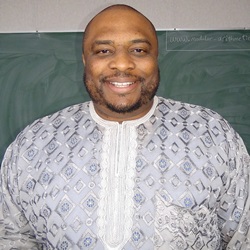Solved Examples on Modular Exponentiation
 Verify your answers as applicable with the
Modulo Arithmetic and Algorithms Calculators
Verify your answers as applicable with the
Modulo Arithmetic and Algorithms Calculators
Solve all questions.
Use the four methods for each question where applicable.
Name each method that you use.
If any method is not applicable, state the reason(s) why it is not applicable.
Verify that you have the same answer for each question using the methods.
Show all work.
Method: Fast Modular Multiplication
$1st$ Step: Convert the exponent to a binary base.
$$
\begin{array}{c|c}
2 & 57 \\
\hline
2 & 28 \:R\: 1 \\
\hline
2 & 14 \:R\: 0 \\
\hline
2 & 7 \:R\: 0 \\
\hline
2 & 3 \:R\: 1 \\
\hline
2 & 1 \:R\: 1 \\
\hline
& 0 \:R\: 1
\end{array}
Count \:the\: remainders\: upwards
$$
$$
57 = 111001_2
$$
$2nd$ Step: Write the place values of the binary digit.
$$
\begin{align}
2^5\ \ 2^4\ \ 2^3\ \ 2^2\ \ 2^1\ \ 2^0\ \ \\
1\ \ \ 1\ \ \ 1\ \ \ 0\ \ \ 0\ \ \ 1~~\ \ \
\end{align}
$$
$3rd$ Step: Simplify. Write the main problem as a product of smaller exponents.
$
3^{57} = 3^{(1 * 2^5 + 1 * 2^4 + 1 * 2^3 + 0 * 2^2 + 0 * 2^1 + 1 * 2^0)} \\[3ex]
= 3^{(1 * 32 + 1 * 16 + 1 * 8 + 0 * 4 + 0 * 2 + 1 * 1)} \\[3ex]
= 3^{(32 + 16 + 8 + 0 + 0 + 1)} \\[3ex]
Apply \:the\: laws\: of\: exponents \\[3ex]
= 3^{32} * 3^{16} * 3^8 * 3^0 * 3^0 * 3^1 \\[3ex]
= 3^{32} * 3^{16} * 3^8 * 1 * 1 * 1 * 3 \\[3ex]
Going\: forward\:, we\: shall\: forget\: the\: zeros \\[3ex]
There\: is\: no\: need\: to\: write\: them \\[3ex]
Because\: any\: base\: exponent\: zero\: gives\: 1 \\[3ex]
3^{57} \mod 317 \\[3ex]
= (3^{32} * 3^{16} * 3^8 * 3) \mod 317 \\[3ex]
= 3^{32} \mod 317 * 3^{16} \mod 317 * 3^8 \mod 317 * 3 \mod 317 \\[3ex]
3 \mod 317 = \color{red}{3} \\[3ex]
We\: have\: 3^8, \:3^{16}, \:3^{32} \\[3ex]
My\: advice:\: Do\: it\: in\: twos\: assume\: 3^8\: gave\: a\: large\: result \\[3ex]
However,\: 3^8 = 6561 \\[3ex]
So,\: we\: can\: go\: ahead\: and\: do\: it\: directly \\[3ex]
3^8 \mod 317 \\[3ex]
= 6561 \mod 317 \\[3ex]
= \color{red}{221} \\[3ex]
3^{16} \mod 317 = (3^8)^2 \mod 317 \\[3ex]
= (221)^2 \mod 317 \\[3ex]
= 48841 \mod 317 = \color{red}{23} \\[3ex]
3^{32} \mod 317 = (3^{16})^2 \mod 317 \\[3ex]
= (23)^2 \mod 317 \\[3ex]
= 529 \mod 317 \\[3ex]
= \color{red}{212} \\[3ex]
3^{57} \mod 317 \\[3ex]
= (3^{32} * 3^{16} * 3^8 * 3) \mod 317 \\[3ex]
= (3^{32} \mod 317 * 3^{16} \mod 317 * 3^8 \mod 317 * 3 \mod 317) \mod 317 \\[3ex]
= (212 * 23 * 221 * 3) \mod 317 \\[3ex]
= 3232788 \mod 317 \\[3ex]
= 22 \\[3ex]
$
$\therefore 3^{57} \mod 317$ = $22$
This means that $231$ needs to be converted to a number in base two.
$ \begin{array}{c|c} 2 & 231 \\ \hline 2 & 115 \:R\: 1 \\ \hline 2 & 57 \:R\: 1 \\ \hline 2 & 28 \:R\: 1 \\ \hline 2 & 14 \:R\: 0 \\ \hline 2 & 7 \:R\: 0 \\ \hline 2 & 3 \:R\: 1 \\ \hline 2 & 1 \:R\: 1 \\ \hline & 0 \:R\: 1 \end{array} Count \:the\: remainders\: upwards \\[3ex] 231 = 11100111_2 \\[3ex] $ $231 = 11100111_2$